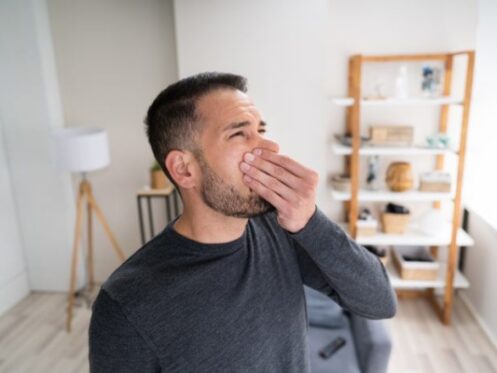Here at PV Heating, Cooling & Plumbing, we’re big fans of energy efficiency upgrades. Any changes that result in lower utility bills and less overall energy consumption are fine by us! We like clean air as much as the next guy.
Of course, the most impactful energy efficiency upgrades are usually pretty big projects. Air sealing between your living space and your attic and crawlspace, beefing up insulation, eliminating air infiltration around windows and doors… these are the upgrades that have the biggest impact on your overall energy consumption.
Basically, anything that tightens up your home is going to make a big difference.
But there’s this thing that can happen when you make these kinds of changes, and it’s annoying.
Tightening up your house can make it smell bad.
Yep. This can happen. Many people are excited to air seal their entire home because they know that reduced air infiltration leads to less AC and heat consumption. What they’re forgetting is that all the air leaks they seal off also provide a lot of ventilation.
Are those air leaks giving you “good” ventilation? No! They aren’t.
They’re usually letting unfiltered, humid air into your home. In other words, they’re giving you the “bad” type of ventilation.
But air exchanges are still air exchanges. It would be a stretch to call air infiltration fresh air, but it’s still a form of air circulation. Think of it this way. Those air leaks, as undesirable as they might be, at least ensured you weren’t breathing the same air over and over again.
Because when indoor space isn’t ventilated, nasty odors can linger.
Your house is full of stuff that creates odors:
- Food
- Garbage
- Bathrooms
- Plastics and components inside manufactured products
- Building materials and products that off gas
- Cleaning chemicals
- Soaps, shampoos, lotions
- Dogs, cats, and other non-human companions
The list goes on! When space is adequately ventilated, those odors don’t tend to linger. Somehow or another, they’re whooshed out of your home.
And while air leaks generally provide excessive ventilation and the wrong type of ventilation if you’re trying to optimize indoor air quality, they were at least preventing the buildup of noxious indoor odors.
Airtight homes may consume less energy. But they might also stink.
Good news: This is a pretty easy problem to solve.
The answer is controlled mechanical ventilation.
These ventilation systems, which usually interface with your HVAC system, ensure you achieve a certain level of fresh air circulation at all times. For really tight homes (think “green” new construction that’s built to be energy efficient), they may even be mandated by building codes.
If you’re thinking, “wouldn’t that just be like re-introducing air leaks into my new, sealed-up, energy-efficient abode?” the answer is no. An adequate mechanical ventilation system usually involves two things that are essential for our climate zone: filtration and humidity management.
Here in Atlanta, you’ve got two viable options for fresh air ventilation: an energy recovery ventilator (ERV) or a ventilating dehumidifier.
An ERV provides balanced ventilation.
Whole-house ERVs integrate with your existing ductwork. They bring in and expel equal amounts of air at the same time, so you’re never pressurizing your home. That’s why we say they’re “balanced.”
Note: Depending on the application, your home performance contractor may suggest tweaking the ERV defaults to provide positive pressure to your home. It’s possible and sometimes advisable to do this.
In addition to filtering the air, an ERV transfers moisture from the more humid airstream (whether incoming or outgoing) to the less humid one. In summer, this means the air coming in will hold less humidity than the air outdoors. In winter, it means you retain some of the humidity inside your home.
All things considered; we think they’re the best way to ventilate.
A ventilating dehumidifier provides positive pressure.
A dehumidifier does exactly what its name implies. It removes humidity from your indoor air.
But when you get a ventilating dehumidifier, you can bring fresh air into your home at the same time! A properly installed ventilating dehumidifier filters the incoming fresh air and removes humidity before sending the air into your living space.
When you have this kind of ventilation system, it’s not balanced like an ERV. It’s introducing air from the outdoors. The system pushes fresh air into your home.
This is preferable to the type of “ventilation” you get from air leaks, which usually involves unfiltered, humid air. Air leaks’ negative impact is also magnified by negative pressure caused by activities inside the home, such as running a clothes dryer or kitchen fan.
In winter, when the dehumidifier isn’t running, you can still set the system to bring in the fresh air. The outdoor air used for ventilation still passes through the dehumidifier’s filter.
Know what’s more important than the type of ventilation system you choose?
Ensuring the system is sized properly for your home. That’s what.
The best way to go about energy efficiency improvements is to start off working with a home performance professional who can perform a whole-home energy audit. That way, you can determine whether you’ll need mechanical ventilation — and how much you need — before pursuing an air sealing project!
When you don’t go that route, you run the risk of having a stinky home that doesn’t get enough fresh air. The problem is still very solvable, so don’t worry! You just need to get a home performance pro in there to crunch some numbers, determine how much fresh air you need, and point you toward the right system for your needs.
Every home can benefit from fresh air ventilation.
It’s essential for airtight homes, but it’s helpful in nearly all homes.
Mechanical ventilation systems help ensure that more of the ventilation in your home is the “good” kind, whether balanced or positive pressure. That way, you breathe fresher, healthier air all the time and reduce the overall negative effects of infiltration on your health and comfort.
At PV Heating, Cooling & Plumbing, we’re home performance experts who perform whole-house analyses on homes all over metro Atlanta.
We can help you determine which energy improvements will have the biggest impact. In addition, we can show you whether a mechanical ventilation system will help you avoid having a stinky house.
And if your home already stinks after performing energy efficiency upgrades, we can help with that, too. To start the conversation, give us a call or send a message today!

